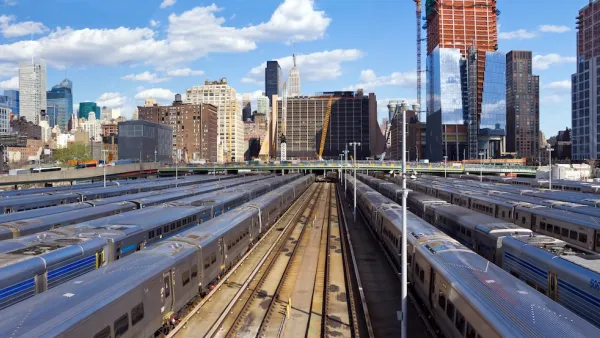The prevailing wisdom is that as a neighborhood gentrifies, long-time, low income residents are forced to move out because of rising rents, i.e. displacement. Two studies from Columbia University and the Federal Reserve draw different conclusions.

NPR News investigative correspondent Laura Sullivan "has cast a light on some of the country's most disadvantaged people." In this piece, which you can listen to as well as read, she reports from a changing, "gentrifying" if you will, neighborhood in the District of Columbia. And that means poor people are being forced out, right?
Lance Freeman, the director of the Urban Planning program at Columbia University [and Planetizen blogger], says that's what he believed was happening, too. He launched a study, first in Harlem and then nationally, calculating how many people were pushed out of their homes when wealthy people moved in.
His findings surprised even him. "(P)eople in neighborhoods classified as gentrifying were moving less frequently", he states. "Freeman's work found that low-income residents were no more likely to move out of their homes when a neighborhood gentrifies than when it doesn't," Sullivan writes.
"That squares with a recent study by the Federal Reserve Bank of Cleveland," writes Sullivan.
"We're finding that the financial health of original residents in gentrifying neighborhoods seems to be increasing, as compared to original residents in nongentrifying, low-priced neighborhoods," says Daniel Hartley, a research economist with the bank.
"He says higher costs can push out renters, especially those who are elderly, disabled or without rent-stabilized apartments. But he also found that a lot of renters actually stay — especially if new parks, safer streets and better schools are paired with a job opportunity right down the block," writes Sullivan.
Read here the results of a recent survey about who benefits from redevelopment in neighborhoods in the District. More findings from the Federal Reserve study can be found here.
FULL STORY: Gentrification May Actually Be Boon To Longtime Residents

Analysis: Cybertruck Fatality Rate Far Exceeds That of Ford Pinto
The Tesla Cybertruck was recalled seven times last year.

National Parks Layoffs Will Cause Communities to Lose Billions
Thousands of essential park workers were laid off this week, just before the busy spring break season.

Retro-silient?: America’s First “Eco-burb,” The Woodlands Turns 50
A master-planned community north of Houston offers lessons on green infrastructure and resilient design, but falls short of its founder’s lofty affordability and walkability goals.

Test News Post 1
This is a summary

Analysis: Cybertruck Fatality Rate Far Exceeds That of Ford Pinto
The Tesla Cybertruck was recalled seven times last year.

Test News Headline 46
Test for the image on the front page.
Urban Design for Planners 1: Software Tools
This six-course series explores essential urban design concepts using open source software and equips planners with the tools they need to participate fully in the urban design process.
Planning for Universal Design
Learn the tools for implementing Universal Design in planning regulations.
EMC Planning Group, Inc.
Planetizen
Planetizen
Mpact (formerly Rail~Volution)
Great Falls Development Authority, Inc.
HUDs Office of Policy Development and Research
NYU Wagner Graduate School of Public Service




























